|
|
|
Sort Order |
|
|
|
Items / Page
|
|
|
|
|
|
|
| Srl | Item |
| 1 |
ID:
103956
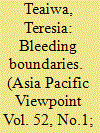

|
|
|
|
|
| Publication |
2011.
|
| Summary/Abstract |
This introduction to an Asia Pacific Viewpoint special section on militarism and gender in the Pacific argues that gendered analyses are crucial to understanding processes of militarization, and that multidisciplinary and interdisciplinary approaches are integral in that effort. The introduction also provides background to the articles, outlining their origin in a workshop on militarism and gender in the Pacific held in Wellington, New Zealand in 2009, and its subsequent iteration in sessions at the Oceanic Conference of International Studies in 2010. The special section constitutes the first publication of a permanent working group on militarism and gender in the Pacific with an international, multidisciplinary membership.
|
|
|
|
|
|
|
|
|
|
|
|
|
|
|
|
| 2 |
ID:
103961
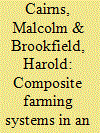

|
|
|
|
|
| Publication |
2011.
|
| Summary/Abstract |
Composite farming systems, first clearly identified by Rambo, are those in which radically different technologies are found together in a single farming complex. Data from diaries kept by groups of farming families in two Angami Naga villages in northeast India, Khonoma and smaller Tsiesema, detailing inputs into and outputs from wet-rice terraces and jhum (swidden) fields in the years 2000 and 2001, are presented and discussed to detail the workings of related but different composite systems. The 2000-2001 survey caught an important set of changes in midstream. Although returns to labour from the first-year jhums were much higher than those from the wet-rice terraces in 2000-2001, jhums were declining in significance as a growing non-farm economy joined the production of cool-climate vegetables and a spice crop for the Indian market as principal sources of livelihood. This story is told in the light of recent writing on the demise of swidden in the larger Southeast Asian region, and it is suggested that greater attention be paid to the composite systems, which are not uncommon in this region. This might help diversify what has perhaps been an oversimplified discussion.
|
|
|
|
|
|
|
|
|
|
|
|
|
|
|
|
| 3 |
ID:
103962
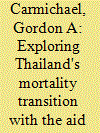

|
|
|
|
|
| Publication |
2011.
|
| Summary/Abstract |
The project Thai Health-Risk Transition: A National Cohort Study seeks to better understand the health implications of modernisation and globalisation forces impacting on Thailand. As part of its 'look-back' component this paper seeks, using available life tables, to document the country's post-war mortality transition. The onset of transition through mass campaigns of the late 1940s and 1950s is first discussed before attention turns to the life tables. They are predictably far from flawless, but careful analysis does permit trends that have seen around 30 years added to life expectancy to be traced, and age patterns of improved survivorship and their relation to initiatives to improve health to be examined. The broad benefits generated by mass campaigns, ongoing improvements in infant and early childhood mortality, and a phased impact of the expansion of primary health care in rural areas on adult survival prospects after the mid-1970s are demonstrated. The paper also investigates the consequences for mortality of a motorcycle-focused rapid increase in road fatalities in the late 1980s and early 1990s and the HIV/AIDS epidemic that developed after 1984.
|
|
|
|
|
|
|
|
|
|
|
|
|
|
|
|
| 4 |
ID:
103957
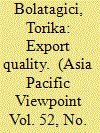

|
|
|
|
|
| Publication |
2011.
|
| Summary/Abstract |
Fijian bodies have become a valuable commodity in the economy of war. Remittances from workers overseas are Fiji's largest income - exceeding that of tourism and sugar export. This essay examines historical and contemporary representations of the black male body that perpetuate the exploitation of Fijians by inscribing the Fijian male body as warrior, criminal and protector. Taking a multidisciplinary approach informed by sociology, cultural theory, Pacific studies, visual culture, feminist and post-colonial theory, my practice is the vehicle through which I address issues of neocolonial commodification of Fijian bodies. Through an analysis of my own staged photographs and vernacular images taken by Fijians working for private security military companies and British and US armies, I hope to challenge audiences to consider their own perceptions of Fijian agency and subjectivity. By theorising the politicisation of the black body and interrogating colonial representations of blackness, I argue that we can begin to create links between the historical and contemporary exploitation of Fijians and that at the essence of both is an underlying racial hierarchy and economic requirement for cheap and, arguably, expendable labour.
|
|
|
|
|
|
|
|
|
|
|
|
|
|
|
|
| 5 |
ID:
103959
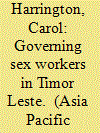

|
|
|
|
|
| Publication |
2011.
|
| Summary/Abstract |
This paper argues that international security forces in Timor Leste depend upon civilian partners in HIV/AIDs 'knowledge networks' to monitor prostitutes' disease status. These networks produce mobile expertise, techniques of government and forms of personhood that facilitate international government of distant populations without overt coercion. HIV/AIDs experts promote techniques of peer education, empowerment and community mobilisation to construct women who sell sex as health conscious sex workers. Such techniques make impoverished women responsible for their disease status, obscuring the political and economic contexts that produced that status. In the militarised context of Timor Leste, knowledge of the sexual conduct of sub-populations labelled high risk circulates among global HIV/AIDs knowledge networks, confirming their expert status while obscuring the sexual harm produced by military intervention. HIV/AIDs knowledge networks have recently begun to build Timorese sex worker organisations by contracting an Australian sex worker NGO to train a Timorese NGO tasked with building sex worker identity and community. Such efforts fail to address the needs and priorities of the women supposedly empowered. The paper engages theories of global knowledge networks, mobile technologies of government, and governmentality to analyse policy documents, reports, programmes, official statements, speeches, and journalistic accounts regarding prostitution in Timor Leste.
|
|
|
|
|
|
|
|
|
|
|
|
|
|
|
|
| 6 |
ID:
103963


|
|
|
|
|
| Publication |
2011.
|
| Summary/Abstract |
Recent literature on natural resource governance has highlighted the consequences of a strong imprint of neoliberal political ideologies on current environmental policies. A parallel theme in the recent literature relates to claims pertaining to ownership and management of natural resources by indigenous minorities in post-colonial Western democracies who have been historically marginalised and impoverished by the aftermath of European colonisation. Recently, in order to respond to indigenous demands to settle long-standing grievances for the return of their ancestral lands and natural resources, some post-colonial governments have encouraged the development of indigenous self-governance and co-management initiatives to manage natural resources such as fisheries and forests. Based on a study of the recent Maori fisheries restitution policy initiatives in Aotearoa/New Zealand, this paper presents a preliminary interrogation of the new hybrid indigenous fisheries governance spaces within the bounds of a neoliberal fisheries management regime.
|
|
|
|
|
|
|
|
|
|
|
|
|
|
|
|
| 7 |
ID:
103958
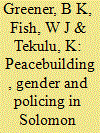

|
|
|
|
|
| Publication |
2011.
|
| Summary/Abstract |
UN Security Council Resolution 1325 calls for a gender perspective to be integrated into the resolution of conflicts. This responsibility manifests itself in a number of more specific proposals, some easily assessable, others less so. In this paper, we begin by considering the success of the Regional Assistance Mission to Solomon Islands (RAMSI) - the poster child for peacebuilding efforts - at meeting these specific proposals. In light of this, we then go on to suggest ways in which RAMSI might meet greater success in fully integrating gender considerations in Solomon Islands by blending sensitivity to gender-based considerations together with a deeper sensitivity to cultural considerations, including cultural understandings of core notions such as 'policing' and 'justice'.
|
|
|
|
|
|
|
|
|
|
|
|
|
|
|
|
| 8 |
ID:
103960


|
|
|
|
|
| Publication |
2011.
|
| Summary/Abstract |
Among Pacific states, Papua New Guinea (PNG) has attracted the most attention from researchers looking at problems caused by small arms and light weapons. There is now a substantive body of work cataloguing different aspects of the country's problems with firearms and gun violence. This research sits alongside a large scholarly literature on violence in PNG and the connection between violence, gender and masculine identities. There has, however, been strikingly little research bringing these literatures together and looking directly at the gendered dimensions of PNG's gun violence. This paper explores some connections between small arms, violence and gender in PNG. After providing a general overview of small arms issues in PNG, it examines the misuse of firearms in urban crime and inter-communal fighting in the Highlands, specifically noting the limited evidence that is available about the differently gendered consequences of gun violence. It identifies three potential areas for further research: exploring the relationship between changing notions of masculinity and demand for firearms; gender and PNG's growing private security industry; and fragile signs of change in the role of women in the PNG Defence Force.
|
|
|
|
|
|
|
|
|
|
|
|
|
|
|
|
|
|
|
|
|